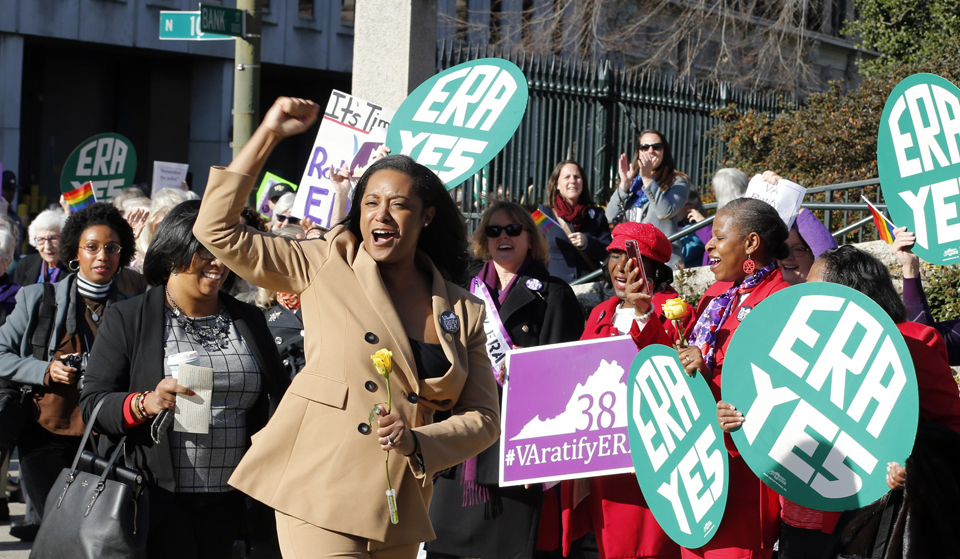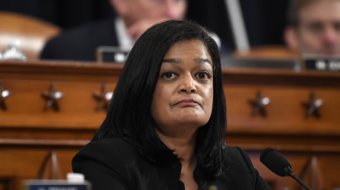
The most progressive Democratic Party members of the Virginia General Assembly (state legislature) are moving quickly to take advantage of their party’s stunning victory in the state legislative elections.
The Democrats “flipped” both the Virginia Senate and the House of Delegates (the lower house), erasing longstanding majorities and giving the Democrats a majority of 55 to 45 in the House and 21 to 19 in the Senate. Given that the governor, lieutenant governor and state attorney general, the three elected executive officers of this state with 8 million inhabitants and eleven federal House districts, are all Democrats, this looks good for advancing several pieces of progressive legislation in the session that begins in January.
Among the legislative initiatives that will be pushed are legislative redistricting in this highly gerrymandered state, expansion of access to Medicaid, background checks for gun purchasers, and prohibition of discrimination in housing for LGBTQ renters. A big item in organized labor will be removing “right to work” from the state’s statute book. Right to work is part of the reason that Virginia has a super low rate of union membership (only 4.3 percent of salaried and wage workers are unionized). Virginia also has extremely reactionary restrictions on union rights of public sector workers.
Another issue that will move forward is the restoration of voting rights for convicts who have served their sentences. Currently, former felons have to petition the governor individually to get their rights restored. Over the last couple of years, strenuous efforts on this item have been stopped cold by Republican intransigence The advocacy organization New Virginia Majority has been a major mover and shaker on this issue and others such as drivers’ licenses for undocumented workers.
The political power of the state’s private electrical service provider, Dominion Energy, is likely to be targeted, probably by legislation prohibiting or restricting its practice of making large campaign contributions.
Now, among a handful of bills already filed for the 2020 session, the issue of the Equal Rights Amendment (ERA) looms large. In the legislative session now ended, the Democrats pushed hard for passage, but this was blocked by the Republican majority—by only one vote. With that majority wiped out, women’s and civil rights organizations are convinced that they can get Virginia added to the list of states that have endorsed the ERA. If they succeed, it will mean that 38 states are on board, which meets the constitutional requirement that three fourths of the states must sign on for an amendment to be tacked onto the federal constitution.
The ERA would obligate the federal government to enforce equal rights for women in public life, and any state government policies that discriminated against women would be unconstitutional. So Virginia’s ratification of the ERA is a “big deal” in practical terms, and not just a symbolic statement of women’s rights.
The ERA in Virginia and nationwide has been targeted for defeat for many years by the chauvinistic and sexist right, notably Phyllis Schlafly’s Eagle Forum. The current version, passed by Congress in 1972, has been delayed for this reason. The opponents of the ERA hoped to run out the clock on its approval which, according to the language of the 1972 Congressional bill, was supposed to mean that if two-thirds of the states had not endorsed it by 1979, it would die.
Subsequently, Congress voted to extend the deadline to 1982, a date which also has passed. But ERA supporters say that’s not the end of the story. Carroll Foy and other supporters of the ERA point out that there is nothing in the U.S. Constitution which authorizes Congress to put time limits on the ratification of constitutional amendments by the states. Carroll Foy has pointedly included this fact in the wording of her resolution. If it passes the Virginia House and Senate, which it almost certainly will, some enemy of women’s rights is sure to raise this issue, which may end up in court or require further constitutional action. Several states who originally ratified the ERA have since then voted to rescind their ratification, but it is also questionable whether they can legally do that. The fight goes on.
Now one of the first bills to be introduced into the 2020 session of the Virginia House of Delegates is House Joint Resolution 1, “Ratifying the Equal Rights Amendment to the Constitution of the United States”. The chief sponsor of this bill is Delegate Jennifer Carroll Foy, who represents the second House District, in Northern Virginia. Carroll Foy, who is African-American, has been focusing on criminal justice reform and other social justice issues since first elected in 2017. This year, she was re-elected without opposition, one of a number of progressive delegates and senators elected with the help of Our Revolution and other grassroots organizations. The district she represents used to be misrepresented in Richmond (Virginia’s capital) by extreme right-wing Republicans, pre-2017 by Mark Dudenhefer, who was known for his anti-immigrant and misogynistic positions.
At writing, it appears that State Senate bills have also been filed, by Sen. Mamie Locke, of the Second Senatorial District in the Tidewater area of Southeastern Virginia, and Senator Jennifer McLellan, of the Ninth Senatorial District (greater Richmond area). So three African-American women Democrats are taking the lead in the new push to ratify the ERA.










